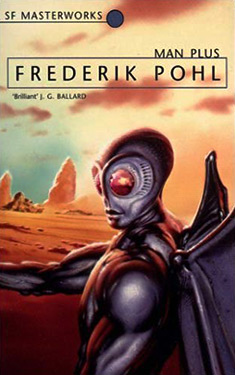Frederik Pohl
Completed 2/10/2021, Reviewed 2/10/2021
4 stars
There have been a lot of books about colonizing Mars throughout the history of Sci Fi. This one, published in 1976, has a different approach. It postulates that to be successful, a human must be modified into a cyborg to thrive on Mars. What we get is a sort of “Six Million Dollar Man” meets Kafka. The majority of the story is about the development of the cyborg. Only a small part of the end actually has him on Mars. It makes for a plodding, but interesting, and at times intense novel. It’s not as action-packed as Pohl’s Hugo winning Gateway. It’s a much more cerebral experience, questioning what it means to be human and a man. This book won the Nebula for 1976 and was nominated for several other awards.
Earth
has become a mess with food shortages, climate problems, international
hostilities, and the threat of global nuclear war. It is believed that the only thing to save us
is the colonization of Mars. The U.S.
experiments with enhancing a human by replacing body parts, including the skin,
with cybernetics. The result is a
demonic looking cyborg that can survive Mars’ harsh elements without a space
suit. The first volunteer has a deadly
stroke. Next on the list is Roger
Torraway. The book goes through the
process of replacing his parts and its effects on Roger, physically, mentally,
and emotionally. It strains his
relationship with his wife. But
eventually, the transformation succeeds and he goes to Mars.
Roger
is an all-round nice fellow. He’s an
astronaut and the hero of a mission to rescue a group of cosmonauts several
years earlier. His character is pretty
decent, but I never quite got in his head.
I could never quite relate to his original nice-guy personality and his
transformation into the morose monster he becomes. This is where the Kafka reference applies. I have never read “Metamorphosis”, but I am
familiar with the basic gist. Roger
doesn’t adjust to his new self until he gets to Mars. I found this hard to deal with. I’m not saying he shouldn’t have had mental
and emotional problems with the transition, but his existential angst dragged
on way too long in my opinion.
I
had a much better time with Father Don Kayman, a Jesuit priest and a brilliant
scientist whose specialty is the study of Mars.
The rule of celibacy has been lifted for priests, and he’s having an
affair with a nun. He struggles with this
relationship. He provides psychological
and spiritual (not religious) support to Roger.
This made him very human and very easy to relate to.
The female
characters are very much ‘70s Sci Fi women.
Dorrie is his wife who he supports in her pottery hobby. Suelie Carpenter is one of his nurses. Both are surprisingly three dimensional, though
they are both relegated to being there for Roger’s pleasure, and pain. There is one amusing scene where Dorrie is
interviewed by Fem magazine where the feminist interviewer grills her on how
she’s going to self-actualize while her husband is on the way to Mars. It was really the only point where there was
some modern aspect for a female character, but I think it was meant to be humorous,
which I found sad. There is more to the
plotlines of Dorrie and Suelie, but to reveal them would be spoilers.
The
writing was kind of strange. The story
is told in third person by an unnamed “we”.
It’s only revealed in the last chapter who “we” are. The prose is pretty good, although sometimes,
it felt like it was a lot of “tell me” rather than “show me” what’s happening
and a fair amount of info dumping. This
made it occasionally slow and plodding, only picking up when there was actual
dialogue.
I
give this book four stars out of five.
Even though I thought the pacing was way too slow, it did make me think a
lot. The premise was original,
extrapolating the “Six Million Dollar Man” concept to a cyborg thriving on
Mars. And it was way different than any
other Mars novel I’ve come across. The
Kafkaesque metamorphosis was nice touch, even though the angst got to me. This was not a light read, but upon
reflection, I did enjoy it in an existential way.

No comments:
Post a Comment